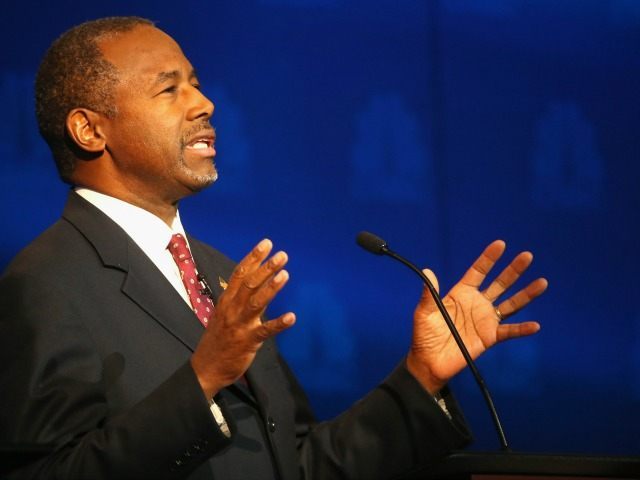With less than 90 days to go until the Iowa caucuses, retired neurosurgeon Ben Carson has edged past Donald Trump in an well-regarded index of national polls.
The RealClearPolitics poll average is a trusted barometer for the state of races, as it effectively smooths out variations between polls.
In the latest average, Carson slips past Trump with 25.3 percent support among Republicans. Trump is second with 24.3 percent
Sen. Marco Rubio is a distant third with 11 percent, followed closely by Sen. Ted Cruz with 8.3 percent. Jeb Bush is 5th with 6.3 percent while Carly Fiorina has 4 percent support.
This is the first time since mid-July that Trump has not lead the GOP field in the poll average. It also marks a water-shed for Carson, who has steadily improved his poll standing throughout the Fall, even while most national pundits panned his performance in the three GOP debates.
Carson’s rise in the polls has come at the expense of Trump. At the end of Summer, Trump dominated the GOP field with 30 percent support. At that time, Carson was second with 20 percent support.
The two outsider candidates still command the support of a majority of Republican voters nationwide, but their poll positions have changed as Trump supporters move towards Carson.
At the other end of the Republican field, Sens. Rubio and Cruz appear to be breaking out from the crowded field of candidates. Both have moved up in the poll average in the last week, likely due to their widely praised performances in the last debate. Both campaigns have ample financial resources to capitalize on this poll movement.
Jeb Bush, Carly Fiorina and the other candidates are fading into margin of error territory in the polls. After three highly-publicized Republican debates, each of which broke cable viewing records, prospects for these candidates look dim.
Trump and Carson have dominated the Republican field now for more than two months. Trump, who has spent and raised very little money in the race, is a politically unique phenomenon. While he has come down a bit from his highest polls, he seems to have a solid lock on about a quarter of the Republican electorate.
Carson’s support has been growing more organically than Trump’s. Carson raised more money that any other candidate in the 3rd quarter and his campaign announced that he had raised another $10 million in October. That monthly total alone is more than Marco Rubio raised in the three months of the 3rd quarter.
While Carson’s rise to the top of the GOP field is noteworthy, it is simply a slight remix of the tune dominating the Republican nomination fight. He and Trump share the support of 50 percent of Republican voters, despite the crowded field of candidates.
The allegiance of these voters may shift between Trump and Carson, they don’t appear to be moving yet to any of the other candidates. The amount of time Trump and Carson have dominated the Republican field puts a lie to pundits’ claims that their support were momentary flirtations or fits of anger that would cool.
Republicans in Washington should take note that half of their voters want a candidate completely outside the existing political environment. The particular details about whether Carson or Trump leads the field at any one time is interesting. The more serious narrative is the utter rejection of the Republican political class.
Trump and Carson are obviously very different candidates. Their appeal, however, is not that different. They are both belittled by the political and media elite and openly mocked by Republican office-holders and opinion writers. They both make statements that horrify the media, but are privately believed by millions of Americans.
Trump and Carson, in their very specific ways, are giving voice to millions of Americans who feel shut out by the political process. One is up today, the other is down. Together, though, they are reshaping the Republican party.

COMMENTS
Please let us know if you're having issues with commenting.